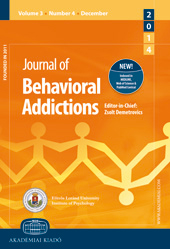Commentary on: Are we overpathologizing everyday life? A tenable blueprint for behavioral addiction research. Problems with atheoretical and confirmatory research approaches in the study of behavioral addictions
Commentary on: Are we overpathologizing everyday life? A tenable blueprint for behavioral addiction research. Problems with atheoretical and confirmatory research approaches in the study of behavioral addictions
Author(s): Daniel Kardefelt-WintherSubject(s): Cognitive Psychology, Behaviorism, Psychoanalysis, Substance abuse and addiction, Health and medicine and law
Published by: Akadémiai Kiadó
Keywords: behavioral addictions; mental health; Internet gaming disorder; Internet addiction; DSM; diagnosis;
Summary/Abstract: This commentary is written in response to a paper by Billieux, Schimmenti, Khazaal, Maurage and Hereen (2015) published in the Journal of Behavioral Addictions. Methods: It supports and extends the arguments by Billieux, Schimmenti et al. (2015): that the study of behavioral addictions too often rests on atheoretical and confirmatory research approaches. This tends to lead to theories that lack specificity and a neglect of the underlying processes that might explain why repetitive problem behaviors occur. Results: In this commentary I extend the arguments by Billieux, Schimmenti et al. (2015) and argue that such research approaches might take us further away from conceptualizing psychiatric diagnoses that can be properly validated, which is already a problem in the field. Furthermore, I discuss whether the empirical support for conceptualizing repetitive problem behaviors as addictions might rest on research practices that have been methodologically biased to produce a result congruent with the proposal that substance addictions and behavioral addictions share similar traits. Conclusions: I conclude by presenting a number of ways of going forward, chief of which is the proposal that we might wish to go beyond a priori assumptions of addiction in favor of identifying the essential problem manifestations for each new potential behavioral addiction.
Journal: Journal of Behavioral Addictions
- Issue Year: 4/2015
- Issue No: 3
- Page Range: 126-129
- Page Count: 4
- Language: English

